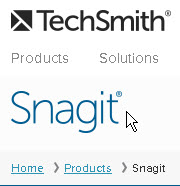Difference between revisions of "Tools: Snagit"
From DurhamtechWiki
Jump to navigationJump to search| Line 41: | Line 41: | ||
* Annotate images: [http://www.techsmith.com/tutorial-snagit-annotate-with-drawing-tools.html Add callouts, arrows, stamps, highlights, text, shapes] | * Annotate images: [http://www.techsmith.com/tutorial-snagit-annotate-with-drawing-tools.html Add callouts, arrows, stamps, highlights, text, shapes] | ||
* Basic Editing: [http://www.techsmith.com/tutorial-snagit-11-basic-editing-in-snagit.html Resize an image, resize the canvas, combine images, add text] | * Basic Editing: [http://www.techsmith.com/tutorial-snagit-11-basic-editing-in-snagit.html Resize an image, resize the canvas, combine images, add text] | ||
| − | * Maintain privacy in your image: [http://www.techsmith.com/tutorial-snagit-maintain-privacy-in-captures.html Blur names/sensitive information] | + | * Maintain privacy in your image: [http://www.techsmith.com/tutorial-snagit-12-maintain-privacy-in-captures.html Blur names/sensitive information] |
===Examples of How Instructors use Snagit=== | ===Examples of How Instructors use Snagit=== | ||
* [http://www.techsmith.com/tutorial-snagit-use-snagit-for-feedback-or-grading.html How to use Snagit for Feedback or Grading] | * [http://www.techsmith.com/tutorial-snagit-use-snagit-for-feedback-or-grading.html How to use Snagit for Feedback or Grading] | ||
* [http://www.techsmith.com/tutorial-snagit-use-snagit-to-conduct-research.html Use Snagit for Research (Documenting sources)] | * [http://www.techsmith.com/tutorial-snagit-use-snagit-to-conduct-research.html Use Snagit for Research (Documenting sources)] | ||
Revision as of 12:23, 2 March 2015
Contents
Snagit
What is Snagit?
Snagit is the "big brother/sister" to Jing. Jing is free, Snagit Academic is available at an affordable price.
- What can you do with Snagit? It helps you create images and videos that explain exactly what you mean and provide better feedback.
- Quickly snag what’s on your screen, enhance it with effects, and then share your creations instantly.
- Don't type lengthy instructions. Provide quick explanations with Snagit, and move on to your next task.
Why do instructors use Snagit?
- They use Snagit to create a screen shot or a picture of what is displayed on your computer screen:
- Show a picture of a diagram or process; provide a roadmap to an important part of your online course materials.
- They use Snagit to create a screencast or a video recording of actions that occur on your computer screen:
- Instructors introduce themselves to their students or provide tours of the online parts of your class.
- With Snagit, instructors can easily record and share video lessons with students: Here's what one instructor did.
How is Snagit different from Jing
- With Jing, videos can only be 5 minutes long, with Snagit, you can make them as long as you like.
- Snagit offers many more tools to mark up your screen shots:
- Call out boxes, automatic numbering, blurring capabilities (to hide names), special characters.
- You can resize, crop or cut-out parts of your screen shots.
- Here's the quick visual of How to move from Jing to Snagit
Getting Started
- Write a script for your video!
- Check out an intro video of "Getting Started with Snagit" or the Snagit "Getting Started Guide" pdf
- Visit the Snagit web site to download the product at home; contact IT to download on your work computer. Or try it out in Tech Center 952.
- The Snagit Learning Center has great tutorials and tips to help you get started using Snagit.
- When you install Jing or Snagit, you create a screencast.com id, where you can store your video and share the link. You can also upload Snagit videos to YouTube.
- Share a link to your script, too!
- Hardware Needed for Screencasting:
- Use a microphone, headset, or webcam for recording audio
- Use your computer speakers or headset to listen to audio
How do you add Snagit screenshots and screencasts to Sakai?
Intermediate How-to's for Screen shots
- Annotate images: Add callouts, arrows, stamps, highlights, text, shapes
- Basic Editing: Resize an image, resize the canvas, combine images, add text
- Maintain privacy in your image: Blur names/sensitive information
